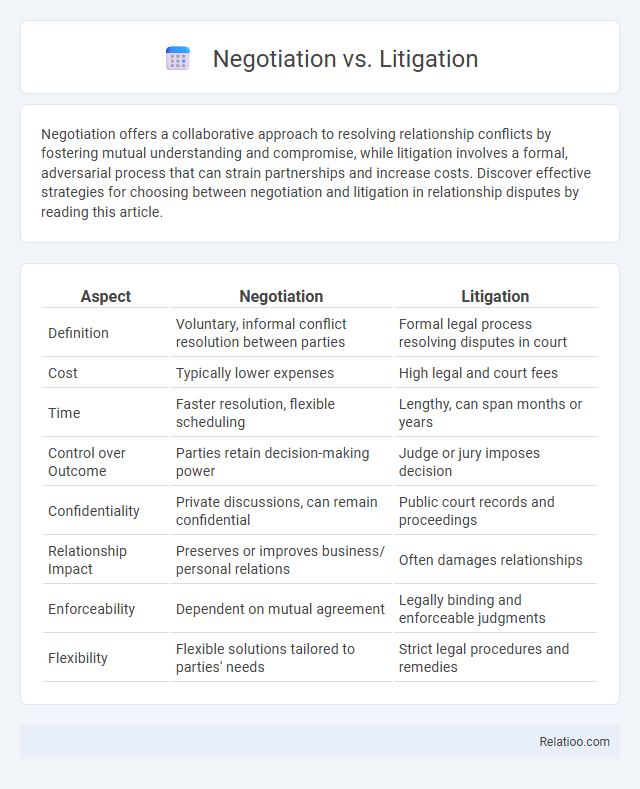Negotiation offers a collaborative approach to resolving relationship conflicts by fostering mutual understanding and compromise, while litigation involves a formal, adversarial process that can strain partnerships and increase costs. Discover effective strategies for choosing between negotiation and litigation in relationship disputes by reading this article.
Table of Comparison
| Aspect | Negotiation | Litigation |
|---|---|---|
| Definition | Voluntary, informal conflict resolution between parties | Formal legal process resolving disputes in court |
| Cost | Typically lower expenses | High legal and court fees |
| Time | Faster resolution, flexible scheduling | Lengthy, can span months or years |
| Control over Outcome | Parties retain decision-making power | Judge or jury imposes decision |
| Confidentiality | Private discussions, can remain confidential | Public court records and proceedings |
| Relationship Impact | Preserves or improves business/ personal relations | Often damages relationships |
| Enforceability | Dependent on mutual agreement | Legally binding and enforceable judgments |
| Flexibility | Flexible solutions tailored to parties' needs | Strict legal procedures and remedies |
Understanding Negotiation and Litigation
Negotiation is a collaborative process where parties communicate directly to resolve disputes, saving time and legal expenses by avoiding court involvement. Litigation involves formal legal proceedings in a court where a judge or jury determines the outcome, often resulting in longer timelines and greater costs. Understanding your options enables you to choose the most effective method to protect your interests and achieve a favorable resolution.
Key Differences Between Negotiation and Litigation
Negotiation involves direct communication between parties to reach a mutually acceptable agreement without court intervention, emphasizing flexibility and control over outcomes. Litigation is a formal legal process where a judge or jury makes binding decisions, often with higher costs and longer timelines. Unlike litigation, negotiation prioritizes collaboration and confidentiality, while litigation is adversarial and public.
Pros and Cons of Negotiation
Negotiation offers a flexible and cost-effective way to resolve disputes by allowing parties to collaboratively reach a mutually beneficial agreement while maintaining control over the outcome. Its advantages include confidentiality, faster resolution, and the preservation of relationships, but drawbacks involve the potential for power imbalances, lack of formal enforceability without a contract, and sometimes an unequal bargaining position that may lead to unsatisfactory compromises. In contrast, litigation provides a legally binding resolution with the enforceability of a court judgment but tends to be time-consuming, expensive, and adversarial.
Pros and Cons of Litigation
Litigation offers a formal legal process where your dispute is resolved by a judge or jury, providing a definitive judgment that is legally binding and enforceable. However, it involves high costs, lengthy timelines, and public exposure, which can strain relationships and lead to unpredictable outcomes. The structured nature of litigation ensures procedural fairness but limits flexibility compared to negotiation or alternative dispute resolution methods.
When to Choose Negotiation Over Litigation
Negotiation should be chosen over litigation when parties seek faster, cost-effective resolution with greater control over outcomes and the preservation of relationships. It is ideal for disputes involving flexible terms, confidentiality concerns, or when both sides are willing to collaborate toward a mutually beneficial agreement. Litigation becomes necessary when disputes require formal legal intervention or when negotiations fail to resolve core conflicts.
The Negotiation Process Explained
The negotiation process involves direct communication between parties to reach a mutually beneficial agreement without resorting to litigation or judgment. This approach emphasizes collaboration, problem-solving, and compromise, often resulting in faster and less costly resolutions. Understanding negotiation empowers you to protect your interests while avoiding the rigidity and expense of court-imposed judgments.
The Litigation Process: Step-by-Step
The litigation process begins with filing a complaint, followed by the defendant's response and initial discovery to exchange relevant evidence. Pre-trial motions and hearings narrow issues before the trial phase, where both parties present arguments, witness testimony, and evidence in court. Your understanding of these steps is crucial for navigating potential judgments or opting for negotiation alternatives.
Costs and Timeframes: Negotiation vs Litigation
Negotiation typically incurs lower costs and faster timeframes compared to litigation, as parties directly resolve disputes without court involvement. Litigation involves extensive legal procedures, leading to higher attorney fees, court costs, and prolonged durations that can span months or years. Judgment follows litigation and may require additional enforcement actions, further increasing overall expenses and extending resolution time.
Impact on Relationships and Future Dealings
Negotiation fosters collaboration and preserves relationships by encouraging open communication and mutually beneficial solutions, which enhances trust and paves the way for positive future dealings. Litigation often damages relationships due to its adversarial nature, prolonged timelines, and high costs, leading to hostility and reluctance for future cooperation. Judgment imposes a final decision that may resolve disputes but can create resentment or compliance without consensus, potentially straining ongoing interactions and impeding constructive partnerships.
Choosing the Right Dispute Resolution Method
Choosing the right dispute resolution method depends on factors like cost, time, control, and relationship impact. Negotiation offers flexibility and preserves relationships by allowing direct communication, while litigation involves formal court procedures that can be costly and time-consuming but enforce legally binding decisions. Your choice should align with your goals for resolution speed, confidentiality, and the desired level of control over the outcome.

Infographic: Negotiation vs Litigation
 relatioo.com
relatioo.com